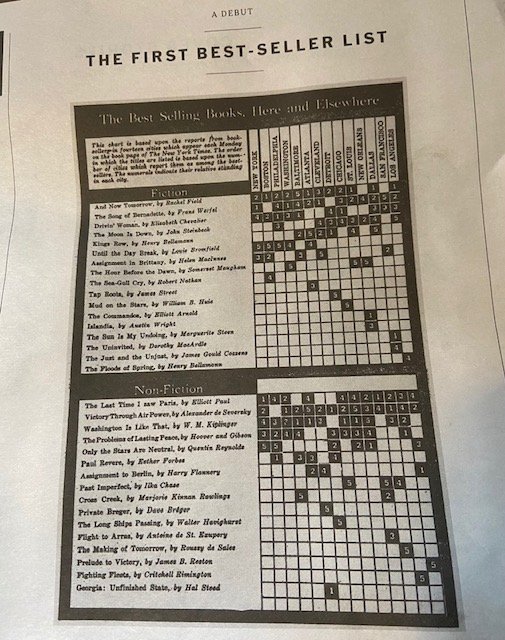BESTSELLERS & BEST FRIENDS
My book publishing blog, with murder mysteries woven through it.
If this is your first visit, be sure to start with “1. Let’s do it!”
______________________________________________________________________
Over lunch, I told Rich that I could make him a bestselling author but he could never, never, never tell anybody how it happened. That I would deny, deny, deny. That’s why the lunch, and not a phone call or email. I needed my deniability moment.
(And now with this blog post these many years later, out the window goes my deniability.)
I explained to Rich how the New York Times surveyed a specific selection of 100 bookstores every week to determine its bestsellers. The list of stores changed a bit from time to time, but essentially, we had the store list.
The first NYT bestseller list. Sure, long before my day but in reality, similar to those in my day. If you knew what bookstores were reporting in Philadelphia, Boston, Detroit, Atlanta, etc. one could orchestra buys at those stores and end up with a bestseller. I (and Rich) caught the last days of the NYT’s flawed methodology.
Quite simply, if Rich orchestrated what looked like a random buy of, say, 25 copies of his book at each of those bookstores, he’d go on the bestseller list. “Looked like” did not mean one person buying 25 books at one time. It meant 13 or 25 different individuals purposely going into each store at a random time within a targeted week and buying one or two books.
“Who’s buying the books,” Rich asked.
“Your clients. They owe you, right? And because you had to bail them out on some sleazy thing they did, they’re the sorts to do this, uh, well, sleazy thing. You have lots of clients, they’re all over the country, they can make this happen.”
I explained that the shit may hit the fan. Bookstores might spot what you’re up to. Or the Times, or another book publisher might. I said, “If that happens you handle it, you keep your publisher out of it!”
Pub date came, I got the list of reporting bookstores to Rich and he launched the orchestrated buy. And as I knew would happen, the book went onto the Times bestseller list.
Which caused stores to re-order more copies of Rich’s book. And display them front-of-store at a discounted price just like they do all bestsellers. Plus, making the bestseller list always caused a fresh round of media exposure.
We got away with the scam. No grief from anybody. We stole ourselves a bestseller. Another publisher got caught doing the same thing six months later and oh boy, they took a lot of grief. Publishing media and The New York Times ripped into them. And, get a load of this, they hired Rich and his firm to manage the crisis. Oh, the irony!
I was relieved that the scam was exposed, and the Times fixed the flaw in their system. This scam stuff wasn’t me. It’s not how I published.
Tomorrow: It should have been Freeman’s book

